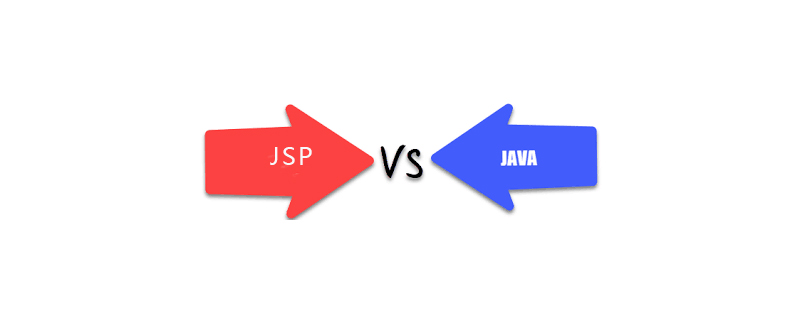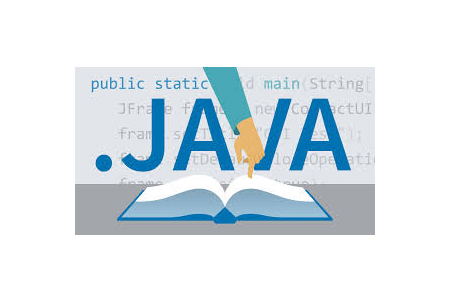What is the difference between Java and JSP
The differences between Java and JSP are: 1. Java is an object-oriented programming language, while JSP is a web page technology based on Java for developing dynamic content; 2. Java is responsible for logical business processing, and JSP is responsible for page display and so on.

【Recommended course: Java Tutorial】
JAVA is a programming language that can write applications and is mainly used in network programming. JSP is a network programming language based on JAVA and can only be used on web pages. Next, I will introduce the differences between Java and JSP in detail in the article, which has a certain reference effect and I hope it will be helpful to everyone.
Java Language
Java was originally developed by Sun Microsystems, initiated by James Gosling and released in 1995 as the Sun Microsystems Java Platform (Java 1.0 [J2SE ]) core components. As Java has grown and its widespread popularity, multiple configurations have been built to suit various types of platforms. For example: J2EE for Enterprise Applications, J2ME for Mobile Applications. The Java language has the following characteristics: object-oriented, platform independent, portability, multi-threading, high performance, distributed, etc.

JSP Language
JSP stands for JavaServer Pages, which is a technology used to develop Web pages that support dynamic content. It helps developers to insert Java code in HTML pages by using special JSP tags, most of which start with <% and end with %>.
The JavaServer Pages component is a Java servlet designed to implement the user interface role of a Java Web application. Web developers write JSPs as text files that combine HTML or XHTML code, XML elements, and embedded JSP actions and commands. Using JSP, you can collect user input through web forms, display records from a database or other sources, and dynamically create web pages.
JSP tags can be used for various purposes, such as retrieving information from a database or registering user preferences, accessing JavaBeans components, passing control between pages, and sharing information between requests, pages, etc.

The difference between Java and JSP
(1) Java is a general computer programming language that is concurrent , class-based, object-oriented, and specifically designed to have as few implementation dependencies as possible. And JSP is a technology that helps software developers create dynamically generated web pages based on HTML, XML, or other document types.
(2) Java applets are written using the Java programming language. JSP uses a mixture of "scriptlet elements" (Java code) and "markup" (usually HTML or XML) programmed to deliver data-driven ("dynamic") web pages.
(3) Java is an object-oriented language, and JSP can be understood as a script
(4) Java is mainly responsible for logic and business processing, while JSP is mainly responsible for page presentation
(5) The essence of JSP is servlet, and the essence of servlet is Java class
Summary: The above is the entire content of this article, I hope it will be helpful to everyone.
The above is the detailed content of What is the difference between Java and JSP. For more information, please follow other related articles on the PHP Chinese website!

Hot AI Tools

Undresser.AI Undress
AI-powered app for creating realistic nude photos

AI Clothes Remover
Online AI tool for removing clothes from photos.

Undress AI Tool
Undress images for free

Clothoff.io
AI clothes remover

AI Hentai Generator
Generate AI Hentai for free.

Hot Article

Hot Tools

Notepad++7.3.1
Easy-to-use and free code editor

SublimeText3 Chinese version
Chinese version, very easy to use

Zend Studio 13.0.1
Powerful PHP integrated development environment

Dreamweaver CS6
Visual web development tools

SublimeText3 Mac version
God-level code editing software (SublimeText3)

Hot Topics
 1377
1377
 52
52
 Perfect Number in Java
Aug 30, 2024 pm 04:28 PM
Perfect Number in Java
Aug 30, 2024 pm 04:28 PM
Guide to Perfect Number in Java. Here we discuss the Definition, How to check Perfect number in Java?, examples with code implementation.
 Random Number Generator in Java
Aug 30, 2024 pm 04:27 PM
Random Number Generator in Java
Aug 30, 2024 pm 04:27 PM
Guide to Random Number Generator in Java. Here we discuss Functions in Java with examples and two different Generators with ther examples.
 Weka in Java
Aug 30, 2024 pm 04:28 PM
Weka in Java
Aug 30, 2024 pm 04:28 PM
Guide to Weka in Java. Here we discuss the Introduction, how to use weka java, the type of platform, and advantages with examples.
 Smith Number in Java
Aug 30, 2024 pm 04:28 PM
Smith Number in Java
Aug 30, 2024 pm 04:28 PM
Guide to Smith Number in Java. Here we discuss the Definition, How to check smith number in Java? example with code implementation.
 Java Spring Interview Questions
Aug 30, 2024 pm 04:29 PM
Java Spring Interview Questions
Aug 30, 2024 pm 04:29 PM
In this article, we have kept the most asked Java Spring Interview Questions with their detailed answers. So that you can crack the interview.
 Break or return from Java 8 stream forEach?
Feb 07, 2025 pm 12:09 PM
Break or return from Java 8 stream forEach?
Feb 07, 2025 pm 12:09 PM
Java 8 introduces the Stream API, providing a powerful and expressive way to process data collections. However, a common question when using Stream is: How to break or return from a forEach operation? Traditional loops allow for early interruption or return, but Stream's forEach method does not directly support this method. This article will explain the reasons and explore alternative methods for implementing premature termination in Stream processing systems. Further reading: Java Stream API improvements Understand Stream forEach The forEach method is a terminal operation that performs one operation on each element in the Stream. Its design intention is
 TimeStamp to Date in Java
Aug 30, 2024 pm 04:28 PM
TimeStamp to Date in Java
Aug 30, 2024 pm 04:28 PM
Guide to TimeStamp to Date in Java. Here we also discuss the introduction and how to convert timestamp to date in java along with examples.
 Create the Future: Java Programming for Absolute Beginners
Oct 13, 2024 pm 01:32 PM
Create the Future: Java Programming for Absolute Beginners
Oct 13, 2024 pm 01:32 PM
Java is a popular programming language that can be learned by both beginners and experienced developers. This tutorial starts with basic concepts and progresses through advanced topics. After installing the Java Development Kit, you can practice programming by creating a simple "Hello, World!" program. After you understand the code, use the command prompt to compile and run the program, and "Hello, World!" will be output on the console. Learning Java starts your programming journey, and as your mastery deepens, you can create more complex applications.




